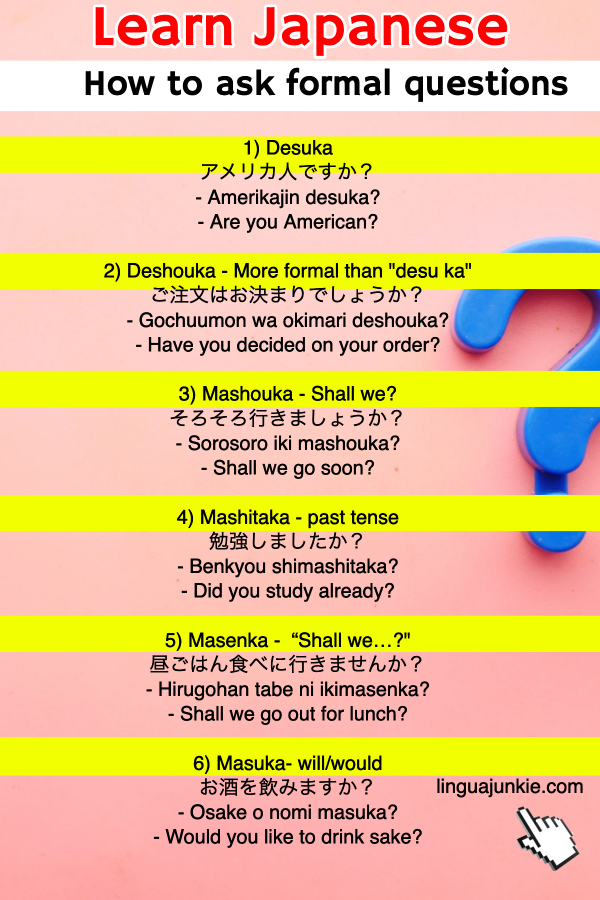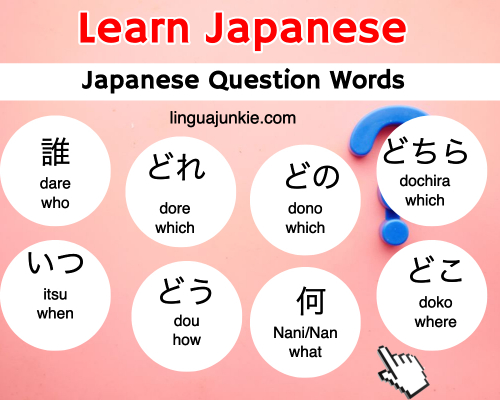how to ask what is this in japanese
You're here considering you want to inquire questions in Japanese, right?
Well, it'southward like shooting fish in a barrel. For the most part, all you need to know is "ka." What's "Ka?" Y'all'll discover out below.

This quick guide is broken up into the following parts.
- Part 1: The Almost Common Way to Inquire Questions
- Function ii: How to ask questions in Japanese (formal)
- Function 3: How to ask questions in Japanese (casual)
- Part 4: Japanese question words
Part 1: The Nearly Common Way to Enquire Questions
The easiest way to ask Japanese questions?
Add か (ka) at the terminate of a phrase.
This "ka" is a Japanese particle for questions and tin can transform almost whatsoever phrase into a question. For example…
- Phrase 1
- 公園に行きます (Koen ni ikimasu)
- Meaning: "I get to the park"
- Add "ka" to turn it into a question
- 公園に行きますか? (Koen ni ikimasuka?),
- Pregnant: "Do you lot want to go to the park?"
- Phrase 2
- だいじょうぶです (Daijoubu desu)
- Pregnant: "It's okay/I'm okay/You're okay/etc." (depending on the context)
- Add "ka" to plough it into a question
- だいじょうぶですか? (Daijoubu desu ka?)
- Meaning: "Are you okay?" "Is it okay?" etc. (depending on the context)
- Phrase iii
- マイクです (Maiku desu)
- Significant: "I'm Mike"/"Information technology's Mike"/"He's Mike", etc (depending on the context)
- Add "ka" to turn it into a question
- マイクですか? (Maiku desu ka?)
- Meaning: "Are you Mike?" "Is it Mike" "Is he Mike?" (depending on the context)
- マイクです (Maiku desu)
How does this "Ka"particle sound like? Well, information technology's not complicated at all. It'due south like the "ca" in "car." But here, heed to this free lesson from JapanesePod101 (click here for more easy & gratuitous lessons.)
- JapanesePod101 Acme 25 Questions – Lesson #three – Where exercise you live?"
Printing play to a higher place and you volition hear this question:
- どこに住んでいますか。
- Doko ni sunde imasu ka?
- Where do you lot live?
Now, yous know the easiest fashion to ask questions in Japanese.
So, by using か (ka) and/or question words you tin can ask a broad variety of questions in Japanese. Keep in mind that there are differences in how yous form questions depending on whether you're asking formal or informal questions.
Allow's practice formal questions outset.
Part 2: Formal questions
So, how practise you brand formal Japanese questions?
Well, it depends a lot on the conjugation of the verbs or the "desu."
And of course, you'll need to add the か(ka) particle.
And so, allow's take a wait at some common questions endings.

one) Desuka
A standard catastrophe for formal Japanese questions is desuka. This is used when you're taking the desu couple and turning it into a question with the ka particle.
- アメリカ人ですか?
- Amerikajin desuka?
- Are you American?
2) Deshouka
This is another formal question ending that tin can be more formal than desuka. You'll hear this used in the service industry.
- ご注文はお決まりでしょうか?
- Gochuumon wa okimari deshouka?
- Have you decided on your guild?
3) Mashouka
Mashouka can exist a polite way to say "Shall nosotros…?" in Japanese. If you learned some Japanese grammar, you'll know that this "mashou" is the volitional form that expresses an invitation or a suggestion.
- そろそろ行きましょうか?
- Sorosoro iki mashouka?
- Shall we go shortly?
iv) Mashitaka
If you lot want to ask if someone has done something already, you can apply this formal question catastrophe. Grammar-wise, this is just the catastrophe of verbs in past tense like "tabemashita – I ate, kimashita – I came, shimashita – I did." And, you add a "ka."
- 勉強しましたか?
- Benkyou shimashitaka?
- Did you study already?
v) Masenka
This is similar to mashouka and tin can hateful something similar. It is also a way to say "Shall we…?" Grammer-wise, the "masen" is the polite negative of a verb. So, "ikimasen – I will not get, tabemasen – I will not eat," and so on. Except of course, when you add together the "ka" and use it as a question, you lot're asking in a positive mode instead of the literal negative fashion.
- 昼ごはん食べに行きませんか?
- Hirugohan tabe ni ikimasenka?
- Shall we become out for lunch?
half dozen) Masuka
When asking someone if they desire to exercise something, yous tin can use masuka. This is like "would" in English. Grammar-wise, this is merely the "masu" or polite form ending of a verb. Like, "ikimasu – to go, tabemasu – to eat, shimasu – to do."
- お酒を飲みますか?
- Osake o nomi masuka?
- Would you similar to beverage sake?
Office 3: Informal/casual questions
Now, how do you inquire questions in Japanese… and sound coincidental?
Remember the か (ka) ?
Of course, you practice. Well… You don't always need to add together か (ka) with informal Japanese questions. Casual Japanese is all about dropping various words and particles.
Y'all will meet some examples below.
1) Change your tone of voice — No "Ka"
The nigh common fashion to course informal questions is by changing the tone of phonation. By raising your voice's pitch towards the end of a sentence — like you do in English — yous tin modify it to a coincidental form question. In this case, yous don't take to add any question words or ka.
- 映画見る?
- Eiga miru?
- Wanna watch a picture?
2) "Ka" but no "desu"
For informal questions, you can make question phrases by taking a casual form judgement and adding ka at the stop. However, this can sometimes sound rude or masculine so be conscientious to know the correct situations.
- ご飯食べるか?
- Gohan taberu ka?
- ou wanna eat nutrient?
3) Nai form verbs
This can be a friendlier way to form casual questions than simply changing the tone of vocalisation. All you have to do is change the verb to the nai form. It'southward a way to ask if someone wants to do something.
Like the polite examples above using negative verbs, this is similar. The verb is in the negative merely when used equally a question, you lot're more than and so using it in the positive like…
- カフェ行かない?
- Kafe ikanai?
- Wanna go to a buffet?
- And Not "Don't want to become to a cafe?" Grammar's weird, I know.
4) No or Nano
A feminine fashion to inquire informal questions is by adding "no" or "nano". This can emphasize and bear witness more interest in the question you're asking.
- 明日暇なの?
- Ashita hima nano?
- Are yous free tomorrow?
- パーティー行くの?
- Paatii iku no?
- Are y'all going to the party?
Part four: Japanese question words
If y'all're going to how to inquire questions in Japanese…
Then you should learn Japanese question words.
Question words are a nifty style to add together more than simply asking yes or no questions. You'll often add together these to the beginning of a phrase or in the eye depending on the situation. Even when using question words, yous'll still utilize "ka" at the terminate especially with the formal questions. With informal questions, you can often omit the "ka" and still utilize question words.

ane) Cartel
This is a word that means "who" and tin can be used as a question discussion. Information technology'southward good for request questions when the respond you're looking for is a person.
- 誰の靴下ですか?
- Dare no kutsushita desuka?
- Who's sock is it?
2) Dore
Dore is a general discussion that means "which". It can be used in a wide range of situations.
- どれが欲しい?
- Dore ga hoshii?
- Which practise you want?
3) Dochira
This is a special word that besides means "which". Still, dochira only works when you have two distinct choices.
- どちらを食べたいですか?
- Dochira o tabetai desuka?
- Which would you like to swallow? (out of two choices)
4) Dono
Another word that means "which" is dono. This must always be followed by a type of object you're referring to.
- どの本が好き?
- Dono hon ga suki?
- Which volume do you like?
5) Doko
Doko means "where" and it'south great when you're trying to find out about locations or making plans.
- どこに行きましょうか?
- Doko ni iki mashouka?
- Where shall nosotros go?
six) Itsu
A useful question word when finding out near time is itsu, or "when".
- いつ日本に行きましたか?
- Itsu nippon ni iki mashitaka?
- When did you go to Japan?
7) Dou
Dou is a versatile discussion that can be used to create different phrases that mean "how", "why", or "what".
- 日本語の勉強はどうですか?
- Nihongo no benkyou wa dou desuka?
- How are your Japanese studies going?
8) Nani/Nan
This is how yous say what in Japanese. And, it tin can appear with two different pronunciations — "nani" or "nan". Depending on the way that it interacts with other kanji characters the kanji 何 can exist read either "nan" or "nani."
- 昨日何時に寝ましたか?
- Kinou nanji ni ne mashitaka?
- What fourth dimension did you go to slumber yesterday?
Determination
At present y'all know how to enquire questions in Japanese — formal and informal questions.
Now, if you're looking for a listing of Japanese questions and answers… just click the link to go to my other guide.
Do y'all accept any questions of your own?
Leave me a question.
Either way, thanks for reading and for learning Japanese with Linguajunkie.
– The Principal Lingua Junkie

Source: https://www.linguajunkie.com/japanese/how-to-ask-questions-in-japanese
Postar um comentário for "how to ask what is this in japanese"